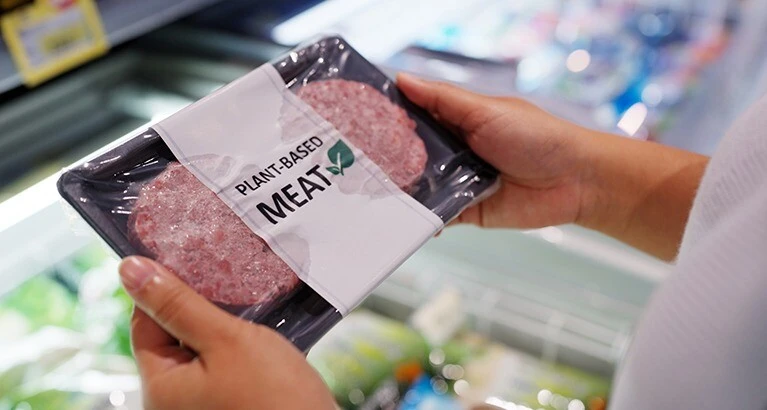Many people are concerned about the environmental effect of meat consumption: meat production requires enormous water use in growing animal feed, livestock and manure produce greenhouse gases including methane and nitrous oxide, and deforestation is a huge problem in parts of the world as farmers seek more grazing lands. Yet when it comes to consumer habits, far fewer are willing to change their meat-eating lifestyles. There is even a term – the meat paradox – for the tendency to eat meat while caring for animals.
So why are consumers so resistant to make a big switch from animal-based products to what’s become known as plant-based meat – made from soy, wheat, mycoprotein, peas and other non-animal sources, and made in ways the closely resemble animal products in flavour, texture and appearance?
The complex reasons behind slow meat-free uptake

Research by Jaideep Prabhu, Professor of Marketing at Cambridge Judge Business School, finds that compared to what is often found in public discourse, most individuals are not pro or against meat substitutes, or meat itself, in a binary way. Instead, there are far more nuanced reasons why meat substitutes have not widely caught on, and these reflect both personal and social factors in complex and interacting ways.
“Some policymakers, particularly in the US, have suggested that consumers are easily confused between meat and non-meat products, but we instead found that consumers evaluate meat substitutes through a complex and usually well-informed eye,” says Jaideep, who is also Vice-Dean for Faculty at Cambridge Judge. “There are clearly cultural and personal obstacles that are holding back more widespread consumption of meat substitutes, and our research provides practical insight to marketers and others involved in this area.
“For example, branding could include more inclusive language that appeals to both meat eaters and plant-based eaters by emphasising the similarities in texture, cooking experience and taste – as this can help overcome cultural barriers and other resistance.”
branding could include more inclusive language that appeals to both meat eaters and plant-based eaters by emphasising the similarities in texture, cooking experience and taste – as this can help overcome cultural barriers and other resistance
Elsewhere in Cambridge: from food app design to doubling vegetarian dishes
The research by Jaideep complements other studies at Cambridge Judge Business School, and elsewhere at the University of Cambridge, that examine consumer behaviour toward meat consumption.
Research led by Dr Paul Lohmann at the El-Erian Institute for Behavioural Economics and Policy at Cambridge Judge Business School found that adjusting the design of menus on food apps like JustEat – listing lower carbon-impact dishes and restaurants first – can reduce the carbon footprint by 12% per order. The study says it “provides compelling evidence for the relative efficacy and cost-effectiveness of choice-architecture nudges on app-based food-delivery platforms to promote healthier and climate-friendlier foods without compromising customer choice satisfaction”. A follow-up study showed that menu repositioning is especially effective when consumers make quick decisions, underscoring the role of contextual factors in shaping nudge effectiveness.
Another paper co-authored by Paul, which focused on university cafeterias, found that carbon footprint labels are a viable tool to encourage more sustainable food choices. “The reduction in high-carbon footprint meals is driven by decreases in sales of meat meals while sales of mid-ranged vegan, vegetarian and fish meals all increased,” the study found.
Professor Lucia Reisch, Director at the El-Erian Institute, is currently involved in the CamEATS ZERO initiative involving the University of Cambridge’s 31 colleges. CamEATS ZERO set out 4 priority actions to reduce environmental harm produced from the food systems, including the reduction of ruminant meat. One early result of the qualitative part of the study is that catering managers in colleges perceived the actions as a loss of choice – for both offering and consuming meals – especially given the observed unpopularity of current plant-based alternatives in their dining halls. The team is currently investigating more reasons why ruminant meat purchased across participating colleges one year after the launch of the initiative has not substantially decreased.
Researchers from the University’s Departments of Public Health, Zoology and Geography examined more than a year’s worth of sales from 3 Cambridge college cafeterias (94,000 meal choices), finding that doubling the number of vegetarian options to 2 in 4 (from one in 4) boosted the proportion of plant-based purchases by between 40-80% without denting overall food sales.
Reddit reveals complex views on meat substitutes
The study by Jaideep looked at 65 discussion threads and nearly 34,000 unique text observations from natural conversations on social media platform Reddit, in order to analyse patterns that affected how people evaluated meat and meat-based substitutes. While previous research in this area has looked at both social and personal concerns regarding meat and non-meat consumption, these studies did not examine the interplay between the various factors that influence whether people eat substitutes for meat.
“We sought to understand have these different factors and concerns balance each other and interact with each other,” says Jaideep. “By evaluating this nexus, we have identified the need for targeted interventions, through advertising and other means, to address these various factors in a way that helps sway consumers toward meat-based substitutes for the benefit of the environment.” As outlined in the research, a big potential market is a rising number of consumers who “identify as ‘flexitarian’ – those who occasionally abstain from meat consumption”.
For example, while previous studies have found that some consumers experience higher taste pleasure from non-meat diets, negative perceptions still persist about the taste of meat substitutes, so overcoming these taste concerns is critical for reducing meat consumption in favour of substitutes. In addition, substitutes are commonly perceived as more expensive than meat, so addressing these economic considerations is crucial.
Why the US and social media platform Reddit illustrate the issue
The US was chosen as the venue for the research for several reasons: it is the second-largest global market (after China) for meat substitutes, there is extensive collaboration between restaurant chains and meat substitutes, and the topic is very divisive in the US with non-linear adoption patterns showing a steep fall-off in meat-substitute consumption in 2023. Globally, the market for meat substitutes is projected to rise from around $7 billion in 2024 to $16 billion by 2032.
Reddit was selected as the social media platform to examine this issue through because its anonymous conversations tend to be more authentic and spontaneous, offering a better palette to delve into the interaction of these various factors around consumption of meat substitutes. The researchers acknowledge that Reddit’s user base is predominantly younger people, age 20-39, so some segments of US consumers are not represented in the Reddit posts, but this demographic does closely align with the key demographic of meat-substitute consumers.
To conduct the research, the authors initially examined articles in mainstream publications like The New York Times, industry sources like VegNews and policy sources such as the US Department of Agriculture to find out how consumers and producers talked about meat substitutes. Common words and phrases were then identified, and fed into the Reddit search engines. This yielded 14 keywords that appeared often in such Reddit discussions, including ‘Beyond Meat’, ‘meatless meat’, ‘fake meat’, ‘lab meat’ and ‘vegan meat labels’. The researchers then extracted 33,797 unique Reddit entries that used these expressions, and analysed how they were used in the context of the 100 words used before and after these keywords.
Navigating cultural norms and personal barriers in meat substitute adoption
The research develops a model that examines 6 concerns in 2 categories:
- Pro-social: encompassing cultural, environmental and animal concerns
- Personal: which includes health, taste and economic concerns
1
Pro-social concerns
These include environmental awareness and concern for animal welfare, but also cultural norms including how meat consumption in many cultures is associated with nutrition and a key source of protein.
“Individuals who abstain from meat are often perceived as challenging these longstanding norms, which can provoke resentment from those who continue to consume animal products, to the extent that research has identified a distinct ’antivegan identity’ that highlights the tension between cultural expectations and personal dietary choices,” says the research co-authored by Jaideep. While previous research had identified a halo effect benefiting products with strong environmental credentials and favourable consumer perception, “the intersection of environmental concerns with other personal factors, such as health, taste, and economic motivations, complicates the full commitment to meat reduction”.
“Also, social issues like fear of stigma can prevent individuals from fully committing to meat reduction. Understanding how environmental motivations interrelate with these factors is essential for designing strategies that overcome barriers to meat substitute adoption, helping align environmental goals with consumer preferences.”
2
Personal concerns
While some consumers get increased taste pleasure from non-meat diets, negative perceptions about the taste of non-meat substitutes persist, so overcoming these concerns is essential to broaden consumer adoption of such substitutes. Non-meat substitutes are also often perceived as more expensive than traditional meat, so this deters consumes from switching despite their ethical and environmental views. “Understanding how economic considerations influence the decision to adopt meat substitutes is essential for making these alternatives more accessible and appealing to a wider range of consumers,” say Jaideep and his co-authors.
One key theme that emerged from Jaideep’s research was how deeply meat consumption is part of tradition and nostalgia, despite growing concerns about the ethics and environmental impact of meat production. This is illustrated in some of the Reddit posts:
- “I can’t wrap my head around meat that didn’t come from an animal”
- “The appeal of eating something pretending to be something else”
- That meat is “one of the elements of food culture that you can’t imitate”
- “Once upon a time meat came from animals”
Reddit posts about labelling underline the importance of accurate terminology in helping to win wider acceptance of meat substitutes. Some people liked the term cultured meat, while the term clean meat met with strong disapproval. One post suggested labelling plant-based substitutes as ‘meap’ because “It’s NOT meat”.
Mixed feelings shape the future of meat alternatives
As the research concludes: “Consumer attitudes toward meat substitutes are multi-faceted, reflecting a spectrum of views rather than clear-cut pro or con positions. Consumers may simultaneously support and oppose alt-meat based on personal values or broader societal considerations, leading to complex interactions between these factors. For instance, those considering meat substitutes from an environmental standpoint may weigh concerns influenced by economic impacts and job considerations.
“Similarly, attitudes towards animal welfare can vary significantly; some consumers oppose large-scale industrial farming while accepting practices in family farming contexts, diverging from those who abstain from animal products altogether. Conversely, supporters of meat substitutes for environmental or animal welfare reasons may perceive its drawbacks related to cultural, health, or economic factors, viewing it as overly processed, artificial, weird, or costly.”
Featured research
Beveridge, I., Prabhu, J., Blackburn, K. and Berry, C. (2025) “The influence of personal and pro-social concerns on consumers’ evaluation of meat substitutes” British Food Journal
Lohmann, P., Gsottbauer, E., Farrington, J., Human, S., and Reisch, L. A. (2024) “Choice architecture promotes sustainable choices in online food-delivery apps” PNAS NEXUS
Lohmann, P. M., Gsottbauer, E., Gravert, C. and Reisch, L. A. (2025) “Nudging, fast and slow: experimental evidence from food choices under time pressure” Environ Resource Econ
Lohmann, P. M., Gsottbauer, E., Doherty, A. and Kontoleon, A. (2022) “Do carbon footprint labels promote climatarian diets? Evidence from a large-scale field experiment” Journal of Environmental Economics and Management
Garnett, E., Balmford, A., Sandbrook, C., Pilling, M. and Marteau, T. M. (2019) “Impact of increasing vegetarian availability on meal selection and sales in cafeterias” Proceedings of the National Academy of Sciences





